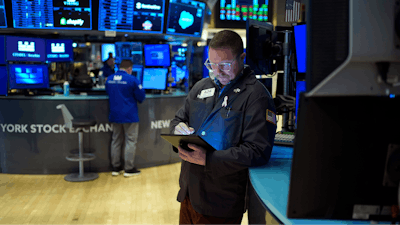
NEW YORK (AP) — Worries about President Donald Trump's tariffs are sending U.S. stocks through sharp swings on Monday as financial markets worldwide drop on concerns about a potential trade war.
The S&P 500 was down 0.7% in midday trading following worse losses for stock markets across Asia and Europe. The Dow Jones Industrial Average was down 99 points, or 0.2%, as of 11 a.m. Eastern time, and the Nasdaq composite was 1% lower.
The U.S. stock market had been on track for a much worse loss itself, with the Dow down 665 points shortly after the start of trading, on worries about how much pain U.S. companies would feel because of the tariffs. Some of the sharpest losses hit Big Tech and other companies that could be hurt most by higher interest rates that could result from the tariffs announced on imports from Canada, Mexico and China.
But stocks pared their losses in the morning after Mexican President President Claudia Sheinbaum said tariffs on her country are on hold for a month following a conversation with Trump.
The ultimate fear is that Trump's tariffs will push up prices for groceries, electronics and all kinds of other bills for U.S. households, putting upward pressure on a U.S. inflation rate that's largely been slowing since its peak three summers ago. Stubbornly high or accelerating inflation could keep the Federal Reserve from cutting interest rates, which it began doing in September to give the U.S. economy a boost.
Much of Wall Street had been hoping Trump's talk of tariffs through the presidential campaign was just that, talk, and an opening point for negotiations with U.S. trading partners. Traders came into Monday morning thinking Trump had actually follow through, raising fear about how much retaliation will occur in what could be an escalating trade war that damages economies worldwide, including the United States.
"The uncertainty at this stage is tremendous - not only of how these eventual negotiations will play out, but worries about how this is only the tip of the iceberg and more tariffs are on the horizon," said Yung-Yu Ma, chief investment officer at BMO Wealth Management.
Traders on Wall Street are paring expectations for how many cuts to interest rates the Federal Reserve may deliver this year, if any. Lower interest rates can encourage U.S. employers to hire more workers, while also goosing prices for investment, but the downside is they can give inflation more fuel.
"Living in the Midwest, I might feel the trade war soonest and most," said Brian Jacobsen, chief economist at Annex Wealth Management, because of how much crude oil flows over the northern U.S. border to make gasoline. "Our refiners can't easily switch away from Canadian crude."
Crude oil prices swung sharply. The price for a barrel of benchmark U.S. crude went above $74.50 in morning trading before pulling back after Mexico's announcement of the pause on tariffs to $72.48, down 0.1%.
Trump himself warned Americans they may feel "some pain" from the tariffs, which he said would be "worth the price" to make America great again. He also said Sunday night that import taxes will "definitely happen" with the European Union and possibly with the United Kingdom as well.
Constellation Brands, the company that sells Modelo and Corona beers in the United States, fell 2.7%. Automakers, which import heavily from Mexico, also sank. General Motors dropped 1.8%. Best Buy, which sells electronics made around the world, lost 3%.
Instead of stocks and crypto, investors moved instead into U.S. government bonds, which are seen as some of the safest possible investments. The resulting rally in their prices drove longer-term Treasury yields down.
The yield on the 10-year Treasury fell to 4.50% from 4.55% late Friday.
It's a reprieve, at least temporarily, from a rise in longer-term Treasury yields that had shaken Wall Street in recent months. Yields have climbed in part on worries about just such tariffs from Trump, and the possible result of higher interest rates they could entail.
Short-term Treasury yields rose Monday as expectations waned for cuts to rates from the Fed. The yield on the two-year Treasury rose to 4.23% from 4.21%
Higher yields put pressure on all kinds of investments, but they're particularly burdensome on stocks seen as the most expensive.
That puts the spotlight on companies like Nvidia and other winners of the artificial-intelligence boom. Nvidia fell 2% and was one of the heaviest weights on the S&P 500.
Such AI superstars had already come under pressure last week, after a Chinese upstart said it had developed a large language model that could perform as well as big U.S. rivals, but without having to use the most expensive, top-flight chips.
That raised doubt about whether all the investment Wall Street had assumed would occur for chips, large data centers and electricity would really have to occur. Such assumptions had driven stocks like Nvidia, Constellation Energy and others to record after record.
The tariffs took center stage in a week where other events would typically take center stage, including a report on Friday showing how many workers U.S. employers hired last month. A slew of profit reports are also due from Alphabet, Amazon and other highly influential companies.
In stock markets abroad, indexes fell 1.1% in London, 1.2% in Paris and 1.5% in Frankfurt. In Asia, South Korea's Kospi sank 2.5%, and Japan's Nikkei 225 fell 2.7%.






















